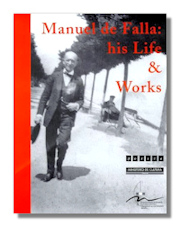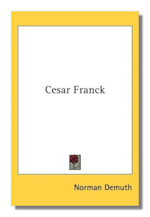Site Search
Follow us on


Affiliates
Books About Music
Biographies

-
Manuel de Falla - His Life & Works. Manzani Diaz Agen (Editor). 1999. ISBN 0711969094 (paperback).
-
Viewed as the greatest Spanish composer of the modern era, Manuel de Falla's reputation rests on only a few works. This work documents his life, including his travels at home and abroad, his meetings with Ravel and Debussy, and his move to the Americas at the outbreak of World War II.
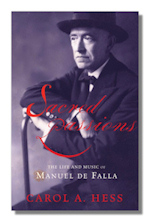
-
Sacred Passions: The Life and Music of Manuel de Falla. author. publisher. 2004. ISBN 0195145615 (hardcover).
-
The work of composer Manuel de Falla (1876-1946) ranges from late-romantic salon pieces to evocations of flamenco to stark neoclassicism. Yet his music has met with conflicting reactions, depending on the audience. In his native Spain, Falla is considered the most innovative composer of the first half of the twentieth century. Likewise, in the United States, Falla enjoyed a strong following in the concert hall. But many of his works, especially some of the "colorful" or "exotic" dances from The Three-Cornered Hat and El Amor Brujo, were taken up during the Latin music craze of the 1930s and 40s and appeared in everything from jazz and pop arrangements to MGM musicals. Similarly enigmatic are the details of Falla's life. He never sustained a lasting, intimate relationship with a woman, yet he created compelling female roles for the lyric stage. Although he became incensed when publishers altered his music, he more than once tinkered with Chopin and Debussy. Despite insisting that he was apolitical, Falla ultimately took sides in the Spanish Civil War, initially allying himself rather half-heartedly with Franco's Nationalists but later rejecting the honors they proffered. All his life, his rigorous brand of Roman Catholicism brought him both solace and agony in his quest for spiritual and artistic perfection. In Sacred Passions: The Life and Music of Manuel de Falla, Carol A. Hess explores these contradictions and offers a fresh understanding of this fascinating composer. Building on over a decade of research, Hess examines Falla's work in terms of musical style and explores the cultural milieus in which he worked. During a seven-year sojourn to Paris just pior to World War I, Falla associated with composers Dukas, Stravinsky, Ravel, and the rest of the group known as les Apaches. Later, back in Spain, he played a pivotal role in the remarkable cultural renaissance known as the "Silver Age," during which Lorca, Bunuel, Dali, Unamuno – and of course Falla himself – made some of their boldest artistic statements. Hess also explores a number of myths cultivated in earlier biographies, including Falla's supposed misogynistic tendencies and accusations of homosexuality, which have led some biographers to consider him a saint-like ascetic. She offers a balanced view of his behavior during the Spanish Civil War, a wrenching event for a Spaniard of his generation, and one that Falla biographers have left largely untouched. With superb analysis of his music and enlightening detail about its critical reception, Hess also examines Falla's status in some circles as little more than a high-class pop composer, given the mass appeal of much of his music. She incorporates recent research on Falla, draws upon untapped sources in the Falla archives, and reevaluates his work in terms of current issues in musicology. Ultimately, Hess places Falla's variegated ouevre, which straddles popular and serious idioms, securely among the best of his better-known European contemporaries. What emerges is a gracefully written, balanced portrait of a man whose lofty spiritual values inspired singular musical utterances but were often at odds with the decidedly imperfect world he inhabited.
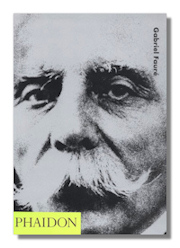
-
Gabriel Fauré. Jessica Duchen. Phaidon Press. 2000. ISBN 0714839329 (paperback).
-
This is a comprehensive biography of the French composer Gabriel Fauré for the general reader, placing his work in the context of his times. Gabriel Fauré (1845-1924) is one of the best-loved French composers of his era: works such as his Requiem, "Pavane", "Dolly Suite, and "Cantique de Jean Racine" are perennial favourites. But Fauré's importance runs far deeper. His music has a unique blend of vigour and restraint, sensuality and purity: an individual voice with a degree of integrity that helped him to resist the overwhelming forces - notably the music of Wagner - that held his Parisian contemporaries in thrall. His artistic independence served to inspire many of the next generation of French composers seeking to create a new Gallic identity beyond World War I. At the Paris Conservatoire, Fauré's composition teaching was vital to such figures as Maurice Ravel, Nadia Boulanger and Charles Koechlin; when he ultimately became the Conservatoire's director, his reforms were the most radical the institution had yet experienced. Fauré has often been thought of as a dreamy, somewhat unworldly individual; this book, however, reveals his ambition and decisiveness. Born in southern France and educated at the Ecole Niedermeyer rather than the powerful Paris Conservatoire, he struggled for years to achieve recognition from France's musical establishment, which often deemed him a dangerous outsider; in his personal life he struggled also against bouts of depression, an unsatisfactory marriage and, later, devastating deafness. Fauré's life and works are explored in the context of the creative melting pot of fin-de-siecle Paris. His relationship with such figures as Saint-SaŽns, Liszt, Proust and Verlaine are considered in detail and help to create a portrait of this fascinating milieu. This biography, which charts Fauré's long and difficult rise to fame, sets out to illuminate his individuality and reveal his enduring legacy to French music.
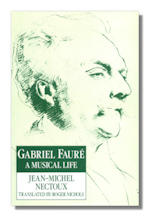
-
Gabriel Fauré - A Musical Life. Jean-Michel Nectoux, with Roger Nichols (translator). Cambridge University Press. 1991. ISBN 0521235243 (paperback).
-
Jean-Michel Nectoux's important new biography of Gabriel Fauré is the most comprehensive study yet of this central figure of fin de siecle France. It traces the composer's life and the rich cultural milieu in which he lived and worked: the world also of Saint-SaŽns, Flaubert, Verlaine, Ravel, Debussy and Proust. A large part of the book considers Fauré's music, with particular emphasis on his adjustment to the musical language of the twentieth century and the formation of his late style. Works in all genres are discussed in detail. The book is the fruit of over twenty years' research by Nectoux, the foremost authority on Gabriel Fauré. He has read more than 5000 previously unpublished letters and has unearthed more than 120 musical manuscripts in the process of writing this definitive study. The text is richly illustrated with rare photographs from Fauré's lifetime and contains an extended chronology of the composer's life, a complete chronological listing of all his own works and a detailed bibliography.
-
Gabriel Fauré (1845-1924). Charles L. Koechlin. AMS Press. 1976. ISBN 0404146791 (hardcover).
-
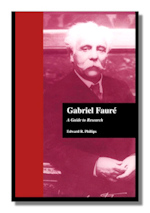
-
Gabriel Fauré - A Guide to Research. Edward R. Phillips (Editor). Garland Publishing. 1991. ISBN 0824070739 (hardcover).
-
The Guide provides basic facts about Gabriel Fauré's life and works. It is a compact source of information concerning both the nature of primary sources related to the composer and the scope and significance of the secondary sources which deal with him, his compositions, and his influence as a musician and teacher. The various sections of this work present a chronology of Fauré's life (with reference to the principal biographies), a list of his writings and compositions, a descriptive list of autograph manuscripts indicating their locations in libraries and private collections, an annotated bibliography of articles, books and theses divided into the following categories: biography and general commentary; correspondence; discussions of individual genres and works. The afterward offers suggestions for further research. An index is provided.
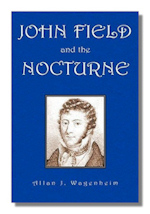
-
John Field and the Nocturne. Allan J. Wagenheim. Xlibris. 2006. ISBN 1425700195 (paperback).
-
John Field is the most misunderstood composer in the history of classical music. The author, a former educator, classical pianist, and member of the Aldenori Piano Trio, finally sets the record straight. Pianists both professional and amateur, educators, teachers of piano performance, and musicologists who want to meet the real John Field and understand his finest creations, the nocturnes, will find this book indispensable.
-
The Life and Music of John Field, 1782-1837. Patrick Piggott. ISBN 0520024125 (paperback).
-
John Field is generally credited as creator of the nocturne, later popularized by Chopin.
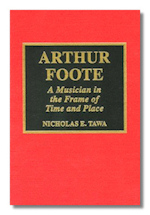
-
Arthur Foote: A Musician in the Frame of Time and Place. Nicholas E. Tawa. The Scarecrow Press, Inc. 1997. ISBN 081083295X (hardcover).
-
Arthur Foote (1853-1937) was one of the most important American composers who worked creatively in the late 19th and early 20th centuries. His musical style was at first Germanic in orientation, soon changing to include Anglo-Americanisms and modifications derived from French and Russian composers. His compositions were highly esteemed by his contemporaries. Moreover, today's listeners continue to be struck by the coherency of his music, both in its general form and in its details. They note a command of craft, an integration of tone with desired expression, and an honest straightforward sound that brooks no pretentious complexities or enigmas of meaning. In addition, he was admired as an educator, musical theorist, keyboard performer, and choral music director. His books and articles on keyboard pedagogy and those containing his insightful contemplation of aspects of modulation and third-relationships in musical structures are still of great value. Assiduous as he was in preserving various aspects of his public life in his several scrapbooks, Foote strove to keep his private life out of the public eye. He discouraged the publication of his more personal letters, and late in life even desired their destruction. This book attempts to gather all the available information in order to give information about the man, his life, and his thinking. Lastly, it looks into the music, what it is, why and where it was written, and what its significance is. With bibliography and musical examples.
-
Arthur Foote 1853-1937: An Autobiography. Arthur Foote, Katharine Foote Raffy (foreward). Kessinger Publishing. 2008. ISBN 1436709318 (hardcover), 1432580329 (paperback).
-
First published posthumously in 1946.
-
César Franck. Norman Demuth. Kessinger Publishing. 2007. ISBN 078129598X (hardcover), 1432583298 (paperback).
-
-
César Franck. Vincent D'Indy. Reprint Services (hardcover), Dover (paperback). 1990. ISBN 0781290627 (hardcover), B000TW7BY2 (paperback).
-
-
Five Great French Composers: Hector Berlioz, César Franck, Camille Saint-Saëns, Claude Debussy, Maurice Ravel - Their Lives and Works. Donald Brook. Books for Libraries. 1977. ISBN 0836980794 (hardcover).
-
-
Girolamo Frescobaldi. Frederick Hammond. Harvard University Press. 1983. ISBN 0824085558 (hardcover), 0674354389 (paperback).
-
-
Frescobaldi Studies (Sources of Music and Their Interpretation). Alexander Silbiger (Editor). Duke University Press. year. ISBN 0822307111 (hardcover).
-
Collection of papers based on the Quadricentennial Frescobaldi Conference, Madison, Wis., 1983.
Wilhelm Furtwängler
-
Furtwängler. Hans-Hubert Schonzeler. Amadeus Press. 1990. ISBN 0931340314 (paperback).
-
















